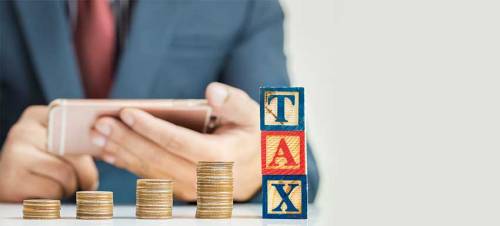Here's how you can make 2021 your best tax saving year
Like the new year, that is. 2021, people must commit to making the most of the year in terms of tax savings. There are many options that can be used to save tax
- by B2B Desk 2020-12-18 06:31:10
2020 was one of the most uncertain years of the human age. The COVID-19 pandemic has made people realize that saving for the future and uncertainty is important. Also, saving leads to tax planning and investors may end up paying lower taxes or not paying taxes at all.
Like the new year, that is. 2021, people must commit to making the most of the year in terms of tax savings. There are many options that can be used to save taxes.
An individual can take advantage of a deduction of up to Rs 1.5 lakh under Section 80-C of the Income Tax Act, and there are many options available to take advantage of this exemption. Some of them give fixed returns and others differ because they are market related instruments.

For people in the mid 50s who are unwilling to take risks, says Nitin Shahi, CEO of Findoc Group, they should choose fixed yield instruments like fixed deposits, the National Savings Certificate (NSC), the National System of Pensions (NPS) and the Public Provident Fund (PPF). It is a better option.
"Each of them has different returns ranging from 6 percent to 10 percent and the lockout period for all these tools should also be considered during selection," he suggests.
For 40-year-olds, Shahi says that FD or NSC is a better option because the lock-in period is only 5 years compared to PPF, which has a 15-year lock-in period.
"Pension funds like the SBI Pension Fund and the LIC Pension Fund have gained more than 10 percent in the last five years," he explains.
For people in their 40s and younger, a share-based savings system (PPF) and an equity-linked savings system (ELSS) are a better tax planning option.
In Shahi's words, “People should also choose a mixed portfolio to obtain a balanced return with an FPP that provides a fixed interest rate of 7 to 8 percent, as decided by the government, and use market-related products such as ELSS that can give between 12 and 14 percent in the race. "Long-term and has a 3-year insurance period. ELSS schemes like the Long Term Equity Fund and the DSP Tax Savings Fund were able to provide more than 12 percent of returns if invested for 10 years or more." .
For better tax administration, investors should also calculate their tax obligations under both tax regulations and choose a system that includes the lowest tax expense.
This year's Union Budget introduced a new tax system with a lower tax rate, to the benefit of those who could not take advantage of the benefits of the old tax system. However, this system is optional.
While the new tax system has a relatively lower tax rate, one may have to waive some deductions and exemptions, such as those available in Section 80c, 80d of the Income Tax Act.
According to Sahl Arora, Director of Paisabazaar, taxpayers who choose the legacy system should consider investing in ELSS to reduce their tax outlay.
Investments in ELSS are eligible to claim a tax deduction under Section 80C of the Income Tax Act, subject to a maximum of Rs. 1.5 lakh per tax year. Aside from having the lowest insurance period (3 years) among all 80C options, ELSS also includes the potential to generate higher returns over the long term, investing primarily in stocks and equity-related investments. Equities as an asset class tend to consistently outperform other asset classes and inflate by a large margin in the long term, ”says Arora.
According to Aarti Raote, partner at Deloitte India, all deductions must be claimed, such as donations made during the year, increased medical premiums. With the support of the employer, employees can also take advantage of LTC benefits if they meet the required conditions.
Also Read: Top 10 mutual funds to invest - Business2Business
POPULAR POSTS
Loan EMIs to Drop as RBI Slashes Repo Rate - Full MPC December 2025 Highlights
by Shan, 2025-12-05 11:49:44
Zoho Mail vs Gmail (2025): Which Email Platform Is Best for Businesses, Startups, and Students?
by Shan, 2025-10-09 12:17:26
PM Modi Launches GST Bachat Utsav: Lower Taxes, More Savings for Every Indian Household
by Shan, 2025-09-24 12:20:59
$100K H-1B Visa Fee Explained: Trump’s New Rule, Clarifications & Impact on Indian Tech Workers
by Shan, 2025-09-22 10:11:03
India-US Trade Deal Soon? Chief US Negotiator Arrives in Delhi as Talks Set to Begin Tomorrow
by Shan, 2025-09-15 11:54:28
Modi Meets Xi: Trump’s Tariffs, Strategic Autonomy, and the Future of Asia’s Power Balance
by Shan, 2025-09-03 06:40:06
Google Claims Gemini AI Uses Just ‘Five Drops of Water’ Per Prompt, Sparks Debate
by Shan, 2025-08-22 12:34:27
RECENTLY PUBLISHED

Pine Labs IPO 2025: Listing Date, Grey Market Premium, and Expert Outlook
- by Shan, 2025-11-05 09:57:07

The Agentic Revolution: Why Salesforce Is Betting Its Future on AI Agents
- by Shan, 2025-11-05 10:29:23

Top 10 Insurance Companies in India 2026: Life, Health, and General Insurance Leaders Explained
- by Shan, 2025-10-30 10:06:42

OpenAI Offers ChatGPT Go Free in India: What’s Behind This Big AI Giveaway?
- by Shan, 2025-10-28 12:19:11

Best Silver Investment Platforms for 2025: From CFDs to Digital Vaults Explained
- by Shan, 2025-10-23 12:22:46





 Subscribe now
Subscribe now 